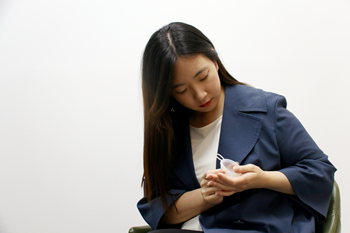
Even though using hygiene products is essential for women, not everyone, such as people with physical or developmental problems find it easy to utilize these products. Three university students, Lim Gi-won, Park Kyu-kyeong, and Oh Joo-eun, took the matter into their own hands.
All three students are studying Industrial Design in Chung-ang University and have now created Dewey, a company that offers unique hygiene products for women. The students are planning to launch ‘Nowsis,’ which will treat products developed for Dewey.
How women with developmental and sight problems deal with menstruation was the question that the founders of Dewey wanted to know and address.
“Women with visual problems need to smell and touch their own secretion in order to check if they have started to menstruate,” said Lim Gi-won, one of the founders of Dewey. She added that this was a shock for her and her team as this problem was never issued before.
“We also wanted women to continue to enjoy their lifestyle while menstruating. So, we decided to design hygiene products that are more comfortable to use and to move around with than the existing products.”
The founders created a concept that they call the ‘blind spot of menstruation.’ This refers to women who are differently abled and find it difficult to deal with menstruation, along with other women who must give up some lifestyle activities such as swimming during menstruation.
“We will constantly strive to help women in the blind spot so that they can enjoy their life,” Lim said.
Dewey has developed a disposable menstrual cup, which uses an applicator like a tampon, and a multi-usable ‘Poicup’ to solve the issues that the company was founded upon. The menstrual cup unfolds as a thin cup in the vagina after being inserted and is folded by itself when taken out. The product also has a thin silicon handle that is used to take out the cup instead of a string.
The second product, Poicup, covers the whole cervix rather than being placed in the vagina. By covering the whole cervix, the urethra and the bladder are not pressured, and different vaginal shapes are not an issue for usage.
Existing menstrual cups have different shapes and methods of folding, and as each woman has a differently shaped vagina, this proved to be an entry barrier for their adoption. Dewey’s 'Poicup' is a one-size-fits-all.
Lim said that the concept of the design came from using various hygiene products. She and her team used various products from many different countries that had unique designs.
By using numerous products, the Dewey team discovered the problems that existing products had and how they could improve.
She added Dewey’s products are currently in the process of gaining authorization from the Ministry of Food and Drug Safety, along with consumer verification, and are yet to go on sale.
“Even though I think menstruation is a blessing for women, experiencing discomfort is inevitable. It is always uncomfortable to sit on wet sanitary pads every day,” Lim commented.
Sanitary pads are one of the most generalized products used by women even though it might not be the best product to use for all women. For instance, sitting on the wet sanitary pads for hours is not a pleasing experience. Lim hopes that women can use Dewey’s products and realize that they can be free from menstruation and do not have to give up their lifestyles because of it.
“It is always a big motivation to receive calls from people who ask for the release date of the product. We will always strive to help women in the blind spot of menstruation.”

